牛津版七年级的英语上册期末重点复习.doc
2024秋沪教牛津新七年级英语上册知识点清单(背诵版)

2024秋沪教牛津新七年级上知识点清单handout(背诵版)Unit 1 Friendship重点词汇一、词性分类1.Nounsguitar吉他courage勇气;胆量friendship友谊;朋友关系admiration钦佩;赞赏respect尊敬;尊重support支持;鼓励trust信任;信赖survey调查quality品质;品德appearance外貌thought想法end 结局heart心2. verbsimprove改进;改善describe描述;形容rise 上升3. adjectiveshonest诚实的patient有耐心的confident自信的;有自信心的personal个性的caring 关心他人的;体贴人的straight直的dark褐色的;乌黑的same同—的;相同的basic基本的;基础的glad高兴的;愉快的4. adverbshowever然而二、词性转换1. courage n.勇气;胆量—encourage v.鼓励2. admiration n.羡慕;钦佩—admire v.羡慕;钦佩3. respect n.尊敬;尊重—respectful adj.表示敬意的;尊敬的4. support v.支持—supportive adj.支持的;鼓励的5. trust n.信任—trustful adj.轻信的trustworthy adj.值得信赖的6. appearance n.外貌;出现—appear v.出现;显得;似乎7. improve v改进;改善—improvement n.改进;改善8. describe v描述—description n.描述9. honest adj.诚实的—honesty n.诚实—dishonest adj.不诚实的10. patient adj.有耐心的—patience n.耐心impatient adj.没有耐心的11. confident adj.自信的;有信心的—confidence n.信心三.一词多义1. respect n.& v尊敬;尊重 3. trust n. & v.信任;信赖2. support n.& v支持;鼓励 4..straight adj.直的adv.笔直地;径直重点短语1. be good at擅长10. watch over照管;监督2. turn to sb. for help向某人求助11. rise into 上升到3. after school放学后12.cry out大叫;叫喊4. be willing to do 愿意做某事13. cry oneself to sleep哭着入睡5. thanks to多亏了14. wake up醒;醒来6. count on依靠(=depend on)15. come and go来去7. medium height中等身高16. take somebody's place替代某人8. modern dance现代舞17. come along 出现9. take care of照顾(= look after / care for)核心句式1. What do you like doing?你喜欢做什么?2.Li Hua is helpful and patient.李华乐于助人且有耐心。
译林版牛津英语七年级上册期末复习知识点
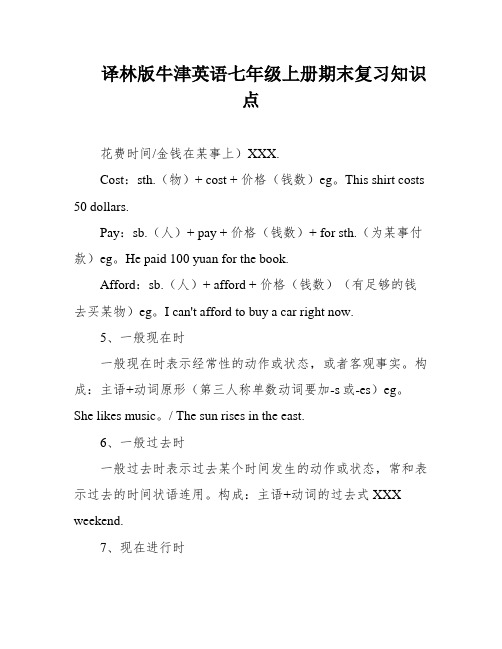
译林版牛津英语七年级上册期末复习知识点花费时间/金钱在某事上)XXX.Cost:sth.(物)+ cost + 价格(钱数)eg。
This shirt costs 50 dollars.Pay:sb.(人)+ pay + 价格(钱数)+ for sth.(为某事付款)eg。
He paid 100 yuan for the book.Afford:sb.(人)+ afford + 价格(钱数)(有足够的钱去买某物)eg。
I can't afford to buy a car right now.5、一般现在时一般现在时表示经常性的动作或状态,或者客观事实。
构成:主语+动词原形(第三人称单数动词要加-s或-es)eg。
She likes music。
/ The sun rises in the east.6、一般过去时一般过去时表示过去某个时间发生的动作或状态,常和表示过去的时间状语连用。
构成:主语+动词的过去式XXX weekend.7、现在进行时现在进行时表示现在正在进行的动作,常和now。
XXX。
currently等时间状语连用。
构成:主语+be动词(am/is/are)+动词-XXX.8、一般将来时一般将来时表示将来某个时间要发生的动作或状态,常和表示将来的时间状语连用。
构成:主语+will/shall+动词原形eg。
I will go to Beijing next month。
/ She shall visit her XXX.9、情态动词情态动词有can/could。
may/might。
must。
shall/should。
will/would。
ought to等。
它们的用法有所不同,但都表示某种语气或情态。
eg。
You should study hard for the exam。
/ She must be at home now.10、被动语态被动语态表示动作的承受者在句子中作主语,动作的执行者在句子中用by引出。
(完整word版)牛津英语7A期末复习归纳

牛津英语七年级A期末复习归纳一、习惯用法1 It’s +形容词(good、difficult、interesting、bad、important……)+for sb +to do sth .= Doing sth is +形容词(good、difficult、interesting、bad、important……)+for sb2 know what to do 、how to do sth 、where to do sthwhen to do sth3 have fun 、have a wonderful/good time doing sth4 practise sth practise doing sth5 sb (主格)+spend+time/money+ on sthsb (主格)+spend+time/money+ (in) doing sth= It takes sb(宾格)+time/money to do sth6 be busy with sth be busy doing sth7get/be ready for sth get/be ready to do sth8 have (no/much…) time to do sth have sth to do9 There be (no/much) time to do sth There be sth to do10Thank sb for sth Thank sb for doing st h11 look forward to sth look forward to doing sth12 need (sb/sth) to do sth13 want (sb/sth) to do sth14 would like (sb/sth) to do sth15 ask / tell sb (not) to do sth16 be good/clever at sth = do well in sthbe good/clever at doing ath do well in doing sth17 It’s one’s (形容性物主代词) first time to do sth18 It’s one’s turn to do sth19 take turns to do sth20 enjoy/like /love/dislike/hate sthenjoy/like /love/dislike/hate doing sth21 help sb with sth /help sb do sth22 Let sb(宾格) do sth23 good luck to sb with sth24 congratulations to sb on sth25 It’s time for sthIt’s time (for sb) to do sth26 use sth to do sth = do sth with sth27 plan to do sth28 be careful with sth29 give sb energy for sth30 start to do sth , begin doing sth31 teach sb(宾格) sth32 why not do sth ?33 finish doing sth34 keep sb waiting (for…)35 be (was / were) born36 can / could / should/ must / may/would (情态动词)+do sth37 will (not) +do sth38 what/how about sth ?39 go running /swimming / fishing/shopping/roller skating/doing sth ?40 have to (不得不) do sth41 do some shopping / cleaning/cooking/washing/reading42 介词+doing sth43 祈使句中:动词用原形44 Best wishes to sb / wish sb to do sth45 share sth with sb二、常用短语1 study / work hard at sth2 worry about sth / sb3 give sb sth = give sth to sb 当sth用代词it/them时用give it/them to sb4 buy sb sth = buy sth for sb 当sth用代词it/them时用 buy it/them for sbmake sb sth=make sth for sb 当sth用代词it/them时用 make it/them for sb5 cut sth out = cut out sth 当sth用代词it/them时 cut it/them out6 go to +地点 + on foot = walk to +地点7 by bike /on the bike ride (a bike)by car / in a car drive (a car)by bus / on a bus = take a bus to +地点go to +地点+ by plane / on a plane flyby train / on a train take a train注意:go home ,go there go to one’s home8 be from = come from9 be nice / polite/ helpful to sb10 borrow sth from sb11 wake sb up = wake up sb12 say hello/ goodbye/ sorry to sb13 go on a trip to +地点 =have a trip to +地点14 one of one’s(形容词性物主代词) friends = a friend of +名词性物主代词15 sound / feel / look /keep +形容词如:sound great , feel happy , look cool , keep healthy16 be like = look likego on holiday / be on holiday / have a (long) holiday17 half an hour one and a half hours =one hour and half an hour18 half a kilo one and a half kilos19 all 用于三者或三者以上 both 用于两者之间他们放在be ,情态动词或助动词do/does之后,行为动词之前all of sth both of sth both…and….20 dress+sbput sth on = put on sth (强调动作)wear sth (be) in sth 表示状态21 much too +形容词too much + 不可数名词动词短语 +too muchtoo many+可数名词的复数22 so many +可数名词的复数 so much +不可数名词23 open 强调某个时间点的动作 be open 强调一段时间内的状态24 something 形容词如:something beautifulanything +nothing to +动词something to eat / drink25 good / well better 比较级best 最高级26 put (putting) cut (cutting) chat (chatting) win (winning)run (running) get (getting) swim (swimming) lie (lying) plan(planning)27 a packet of (some) packets of a bag of (some) bags ofa bowl of (some) bowls of a kilo of (some) kilos ofa bottle of (some) bottles of a carton of (some) cartons ofa basket of (some) baskets of a box of (some) boxes ofa cup of (some) cups of a glass of (some) glasses of28不可数名词: food ,water, milk, juice, orange(桔汁) ,rice, beef, pork, salt, tea,meat.chickenbread,coke,fruit,energy,health,information,news,music,homework, housework,money,hair注意部分可数名词的复数:tomatoes, potatoes,mangoes, knife(knives),shelf(shelves) man(men),woman(women) ,foot(feet),tooth(teeth),sheep(sheep),fish(fish),Chinese(Chinese) ,goldfish(goldfish) ,policeman(policemen)an apple tree (apple trees)a woman/man teacher(women/men teachers)a boy / girl student (boy/girl students)。
牛津译林版七年级上英语期末复习全册知识点归纳
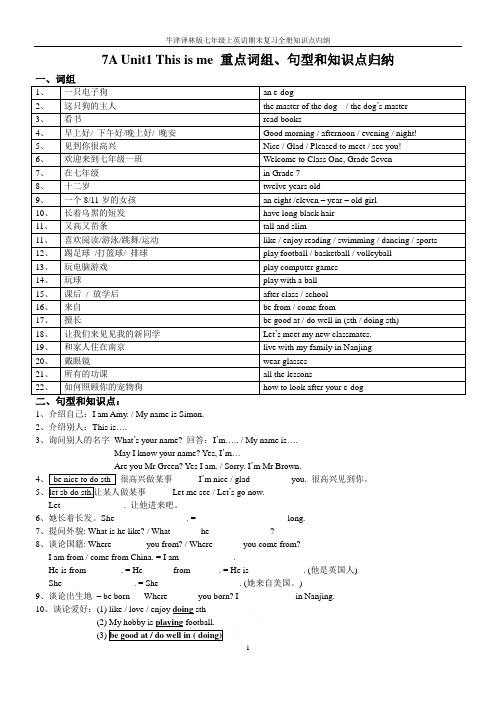
7A Unit1 This is me 重点词组、句型和知识点归纳1、介绍自己:I am Amy. / My name is Simon.2、介绍别人:This is….3、询问别人的名字What’s your name? 回答:I’m….. / My name is….May I know your name? Yes, I’m…Are you Mr Green? Yes I am. / Sorry. I’m Mr Brown.4很高兴做某事I’m nice / glad _________you. 很高兴见到你。
5Let me see / Let’s go now.Let ______________. 让他进来吧。
6、她长着长发。
She _____ _____ _____. = _______ ______ ______ long.7、提问外貌: What is he like? / What ______ he ______ _______?8、谈论国籍: Where _______ you from? / Where ______ you come from?I am from / come from China. = I am ____________.He is from _______ . = He ______ from ______. = He is ____________. (他是英国人)She ________________. = She __________________. (她来自美国。
)9、谈论出生地–10、谈论爱好:She is good at swimming. = She does well in dancing. = She ______ ______.= She is a _____ _______.注意do well in 的否定句例如:他不擅长跳舞。
牛津译林版七年级英语上册期末考试复习题(含答案)
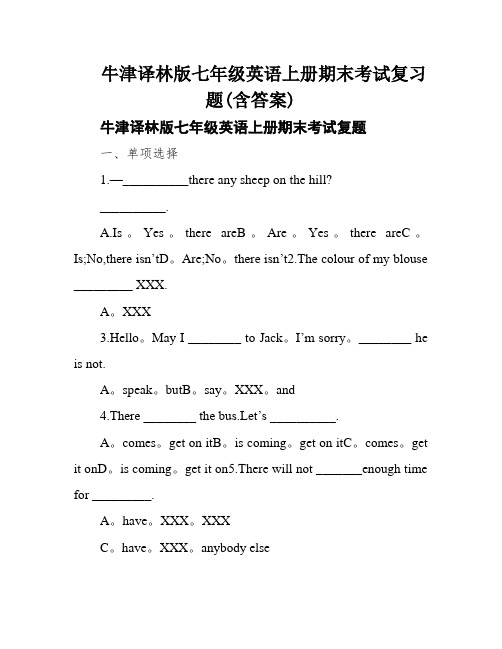
牛津译林版七年级英语上册期末考试复习题(含答案)牛津译林版七年级英语上册期末考试复题一、单项选择1.—__________there any sheep on the hill?__________.A.Is。
Yes。
there areB。
Are。
Yes。
there areC。
Is;No,there isn’tD。
Are;No。
there isn’t2.The colour of my blouse _________ XXX.A。
XXX3.Hello。
May I ________ to Jack。
I’m sorry。
________ he is not.A。
speak。
butB。
say。
XXX。
and4.There ________ the bus.Let’s __________.A。
comes。
get on itB。
is coming。
get on itC。
comes。
get it onD。
is coming。
get it on5.There will not _______enough time for _________.A。
have。
XXX。
XXXC。
have。
XXX。
anybody else6.Could you please help me improve my lessons?___________。
Practice makes perfect.A。
No problemB。
No。
thanksC。
No wayD。
No interest7.—Miss Yang never XXX.__________.XXX.A.Yes。
she doesB.Yes。
she doesn’tC。
No。
she doesD.No。
she doesn’t8.My mother。
together with my father。
__________the dog into the park after XXX.—Which girl is your best friend?The one ________ a blue dress.A.XXX XXX10.Every year Sally has a lot of books to _________.A.XXX11.XXX ________to news on the XXX12.—What________Jim _________?He is tall and strong.A.are。
2020学年牛津英语七年级上册期末复习试题(含答案)
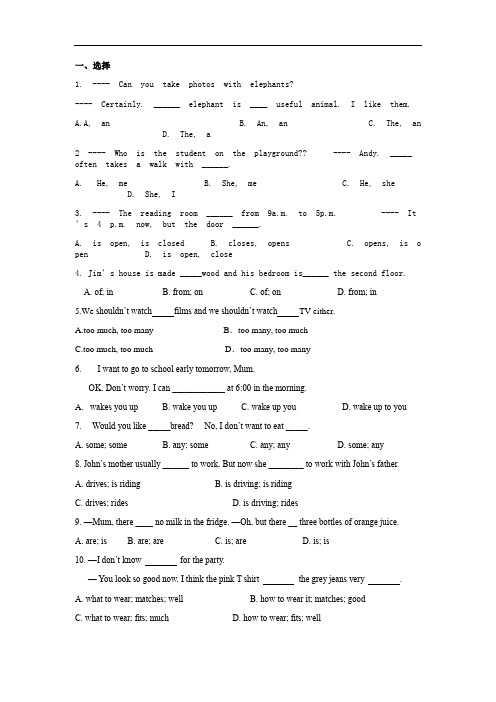
一、选择1. ---- Can you take photos with elephants?---- Certainly. ______ elephant is ____ useful animal. I like them. A.A, an B. An, an C. The, anD. The, a2 ---- Who is the student on the playground?? ---- Andy. _____ often takes a walk with ______.A. He, meB. She, meC. He, sheD. She, I3. ---- The reading room ______ from 9a.m. to 5p.m. ---- It ’s 4 p.m. now, but the door ______.A. is open, is closedB. closes, opensC. opens, is o penD. is open, close4. Jim’s house is made _____wood and his bedroom is______ the second floor.A. of; inB. from; onC. of; onD. from; in5.We shouldn’t watch films and we shouldn’t watch TV either.A.too much, too many B.too many, too muchC.too much, too much D.too many, too many6. ---- I want to go to school early tomorrow,Mum.---- OK.Don’t worry.I can____________at6:00in the morning.A.wakes you upB.wake you upC.wake up youD.wake up to you7. ---Would you like _____bread?--- No, I don’t want to eat _____.A. some; someB. any; someC. any; anyD. some; any8. John’s mother usually ______ to work. But now she ________ to work with John’s father.A. drives; is ridingB. is driving; is ridingC. drives; ridesD. is driving; rides9. —Mum, there ____ no milk in the fridge. —Oh, but there __ three bottles of orange juice.A. are; isB. are; areC. is; areD. is; is10. —I don’t know for the party.— You look so good now. I think the pink T-shirt the grey jeans very .A. what to wear; matches; wellB. how to wear it; matches; goodC. what to wear; fits; muchD. how to wear; fits; well11.—How much do you spend _______ the new boots?—They __________me 50 yuan.A. buying; costB. to buy; costC. buying; spendD. buy; take12. Eating too much is ________ for your ________.A. good; healthB. bad; healthyC. good; healthyD. bad; health13. Look! Here __________ Simon. He ___________ a pink shirt and a pair of jeans.A. comes; is wearingB. goes; is putting awayC. comes; is putting onD. goes; is dressing14.—Why Daniel look happy today?—He happy because he can’t do well in Music today.A. doesn't; doesn'tB. isn't; isn'tC. isn't; doesn'tD. doesn't; isn't15. —You look very cool today, Simon. —_______.A. Really? Thank youB. Oh, I don't think soC. No. I am not cool at allD. Yes.二、完形填空Many middle school students want to look cool. But not everyone can haveenough 1 to buy a lot of cool clothes. Chloe Murray has a(n) 2 to work outthis problem(问题). She opens a charitable clothes closet(慈善衣橱). It's calledChloe's Closet. She is an eighth-grade 3 at Jefferson Middle School in the US.Her school 4 the idea, too. The school lets her 5 a room for theproject(项目). Chloe's classmates join(加入) 6 , too. The charitable clothes closet has lots of fashionable (时尚的)clothes for girls and boys.Chloe thinks fashionable clothes make students look 7 and cool.People around the school and other schools donate(捐)both used and new 8 . The clothes closet is closed from 8 a.m. to 4 p.m.. It is only 9 after school. Students can “ 10” these clothes with the “money” they get. They can get “money” when they hand in(上交) their schoolwork on time or make corrections (改正) on homework. Since it opens, they have “sold” about 100 things to students.1. A. money B. energy C. exercise D. time2. A. answer B. idea C. email D. place3. A. teacher B. parent C. student D. worker4. A. catches B. gives C. likes D. picks5. A. order B. use C. draw D. leave6. A. them B. us C. him D. her7. A. slim B. slow C. smart D. small8. A. clothes B. books C. toys D. school9. A. clean B. free C. late D. open10. A. change B. design C. carry D. buy三、阅读理解(A)Happy Birthday! Do you want to have a special birthday? Have a look at our website (网站)! Birthday partyWe have two kinds of parties. The party will be at your home.Girls please visit www. g-birthday. com. Boys please visit www. b-birthday. com.Birthday dinnerWe have three kinds of set dinner (晚餐套餐) at the cost of $10 to $30 each.Set A$10 per person (每人)Set B$20 per personSet C $30 per personTel: 659 – 4876A. visit www. g-birthday. com.B. visit www. b-birthday. com.C. stay in the school hallD. get a free(免费的)meal( ) 2. You want to order Set B for ten persons(人), how much do you need to pay?A.$100.B.$200C.$300D.$400 ( ) 3. Which of the following is TRUE according to the passage(根据短文)?A. They have three kinds of parties.B. The party will be in a big restaurant.C. They have two kinds of set dinners.D. There are different websites for boys and girls. ( )4. We can’t know about _________ from the passage.A. the telephone number of the websitesB. the cost of set dinnersC. the name of the restaurantD. the address (地址) of the website ( ) 60. The passage(短文)is probably(可能)_________.A. an advertisement (广告) of a websiteB. an invitation (邀请) to a birthday partyC. an advertisement of a restaurantD. a piece of news(新闻)about birthday parties(B)Fast walking is the exercise between walking and race walking. A study shows that fast walking has become the most popular exercise in China and many people walk more than 5000 steps a day. The results of the study are from QQ users. About 37% of the people choose(选择) fast walking as their favorite exercise; over 23% choose running and more than 14% choose riding bikes.Fast walking and running are easy, cost little and work well, so they are popular. And many people like doing exercise in nature not going to gyms. It's best to walk fast for at least 10 minutes at one time and walk up to 6,000 steps every day.The study also shows that people in Guiyang, Guizhou love sports most. On average (平均) everyone there walks 5941 steps every day. It seems that people in places with better environment and air like to do sports better.1. Many people in China walk more than _______________ steps a day.A. 6,000B. 5,941C. 5,000D. 5,4912. Over14%of the Chinese people choose _________ as their favorite exercise.A. B. C. D.3. Many people like to do exercise_____________.A. at homeB. in natureC. in the gymD. on the playground4. What’s the Chinese meaning of the underlined word “environment” in Paragraph 3?A. 大自然B. 环境C.花园 D. 户外5. The writer may think that___________.A. riding bikes is bad for peopleB. it's bad for people to walk fast for more than10 minutes at one timeC. people live in big cities like to do sports betterD. fast walking is not difficult, costs little and works well(C)Jane is only four years old and she doesn’t go to school. But she is very clever and learns a lot from her grandpa—an old teacher. One day, Jane’s mother, Mrs. John takes her to a party. Theguests(客人) all praise(表扬) a rich woman’s son. Mrs. John asks him a few questions, but his answers are wrong. Jane begins to laugh.The rich woman is angry. She tells her friend—a teacher to ask Jane some questions, but the little girl answers all. Then she asks, ‘‘There are three birds in a tree. How many will be left(被留下) if I kill(杀死) one?”“One” answers Jane. “You’re wrong!” calls out the rich woman. “All of them will fly away.” “Do you think a dead(死的) bird can fly?” asks the little girl.The guests begin to 1augh and the woman’s face turns red.1. Jane learns a lot from __________.A. his grandpaB. her motherC. Mrs. JohnD. her grandpa2. How many teachers are there in the story?A. One.B. Two.C. Three.D. Four.3. Who do you think is clever in the story?A. Mrs. John and the guests.B. The woman’s son.C. Jane.D. The rich woman.4. From the story we know that Jane _______.A. only goes to her grandpa’s schoolB. doesn’t want to go to schoolC. will make her mother happy at the partyD. 1ikes birds very much5. Why is the rich woman angry with Jane?A. Jane laughs at her son.B. Jane is a girl.C. Her son can’t answer the questions.D. Jane answers all the questions.四、词汇A) 根据括号中所给的汉语写出单词,使句子正确。
上海牛津英语七年级上册.doc

Unit 1&2一、重点、难点归纳1.冠词a, an, the(1)a用于辅音音素开头的单数可数名词前,如I: a pen, a book, a universityan用于元音音素开头的单数可数名词前,如I: an egg, an hour, an honest boy, an uncle the 用于再次提到的人或事物前,如I: I have a new schoolbag. The schoolbag is black.(2)哪些情况必须使用the:A. ____________________________________ 女口:Please open the doo匸B. ___________________________________ 女口: The sun goes up in the east.C. ____________________________________ 女口: Who is the tallest girl in our class?D ・____________________________________ 女口: the oldE. ______________________________________ 如I: the Smiths⑶不加the的情况:A. ____________________________________ 女口:have breakfast, play basketball, speak English.B. ___________________________________ 女口: in 2011, in winterC. ___________________________________ 女口: my pen, this book2.一般现在时一般现在时表示经常发生的动作或存在的状态、日常行为、习惯或客观事实等。
【期末复习】牛津译林版初一英语上学期期末专项复习-阅读表达(含答案
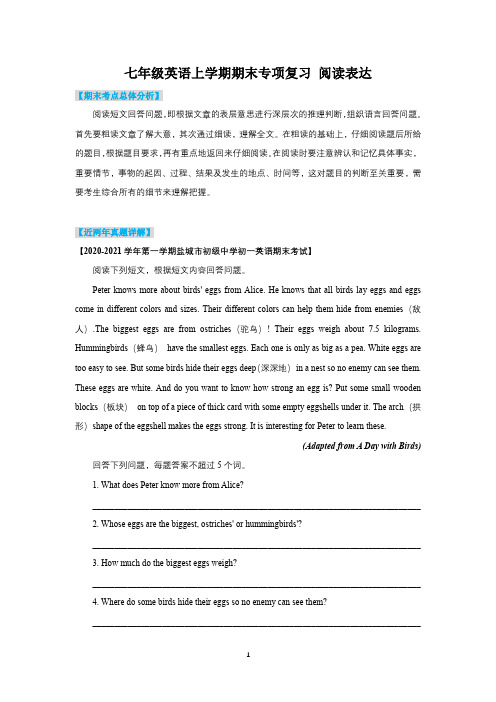
七年级英语上学期期末专项复习阅读表达【期末考点总体分析】阅读短文回答问题,即根据文章的表层意思进行深层次的推理判断,组织语言回答问题。
首先要粗读文章了解大意,其次通过细读,理解全文。
在粗读的基础上,仔细阅读题后所给的题目,根据题目要求,再有重点地返回来仔细阅读。
在阅读时要注意辨认和记忆具体事实,重要情节,事物的起因、过程、结果及发生的地点、时间等,这对题目的判断至关重要,需要考生综合所有的细节来理解把握。
【近两年真题详解】【2020-2021学年第一学期盐城市初级中学初一英语期末考试】阅读下列短文,根据短文内容回答问题。
Peter knows more about birds' eggs from Alice. He knows that all birds lay eggs and eggs come in different colors and sizes. Their different colors can help them hide from enemies(敌人).The biggest eggs are from ostriches(驼鸟)! Their eggs weigh about 7.5 kilograms. Hummingbirds(蜂鸟)have the smallest eggs. Each one is only as big as a pea. White eggs are too easy to see. But some birds hide their eggs deep(深深地)in a nest so no enemy can see them. These eggs are white. And do you want to know how strong an egg is? Put some small wooden blocks(板块)on top of a piece of thick card with some empty eggshells under it. The arch(拱形)shape of the eggshell makes the eggs strong. It is interesting for Peter to learn these.(Adapted from A Day with Birds)回答下列问题,每题答案不超过5个词。
牛津深圳英语七年级上册英语全册语法复习提纲(实用,必备!)
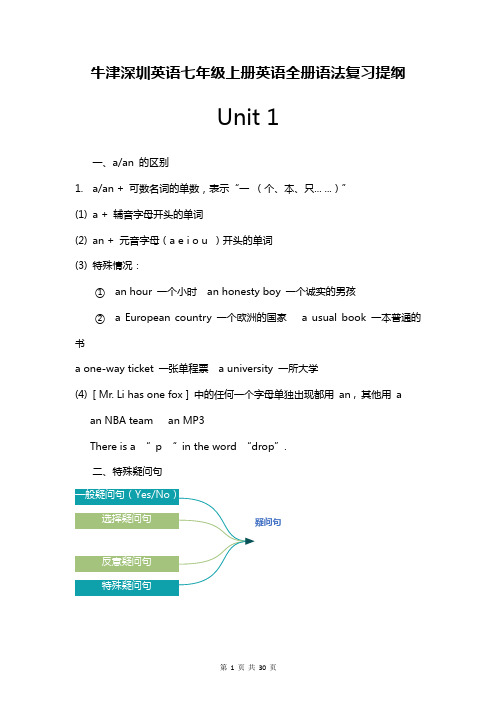
牛津深圳英语七年级上册英语全册语法复习提纲Unit 1一、a/an 的区别1.a/an + 可数名词的单数,表示“一(个、本、只... ...)”(1)a + 辅音字母开头的单词(2)an + 元音字母(a e i o u )开头的单词(3)特殊情况:①an hour 一个小时an honesty boy 一个诚实的男孩② a European country 一个欧洲的国家 a usual book 一本普通的书a one-way ticket 一张单程票 a university 一所大学(4)[ Mr. Li has one fox ] 中的任何一个字母单独出现都用an , 其他用aan NBA team an MP3There is a “p “in the word “drop”.二、特殊疑问句1.结构:特殊疑问词+ 一般疑问句2.常见的特殊疑问词:(1)What 什么(2)Which 哪一(个,本,页.......)(3)Why 为什么(4)How 如何,怎样(5)When 什么时候(6)Where 哪里(7)Who 谁whose 谁的(8)How long 多长(问长度),多长时间eg. How long is this room?How long do you stay in Shenzhen?(9)How far 多远(问距离)eg. How far is it from your home to your school?(10)How many:多少(问可数名词的数量)How many + 可数名词复数+ 其他?How many books do you have?How many people are there in your family?(10)How much 多少(问不可数名词数量);多少钱(问价格)问数量:How much + 不可数名词+ 其它?How much money do you have?问价格:How much + be(is/are)+ 物体?How much is this book?How much are these apples?(11)How often:多久一次(问频率)—How often do you go to school?—Five times a weekonce 一次twice 两次three times 三次four times 四次(12) How soon: 多快—How soon will you come back?—In two days.(13) How often:多久一次(问频率)How often do you go to school?你多久上一次学?Five times a week 一周五次once 一次twice 两次three times 三次four times 四次(14)How soon :多快(将来时)How soon will you come back?In four days 四天后3.(1)问天气:How is the weather=What is the weather like?(2)问年龄:①How old + be (is/are) + sb. ?②How old are you?③How old is your mother?④What ‘s sb’s age?(3)问工作①What be (is/are) + sb. ?②What is he?③What are you?④What do/does sb. do? What do you do?(3)问日期:what date is it today?=what is the date today? 今天是几号?(4)问星期:what day is it today?= what is the day today? 今天是星期几?(5)问时间点:What time is it now?= what is the time now? 现在是几点?Unit 2一般现在时:(和时间有密切关系)一、谓语1.我喜欢你主语谓语宾语他每天学习英语主语时间状语谓语宾语二、什么情况下可以使用一般现在时1.经常性、习惯性动作2.表示兴趣、爱好3.事物的一般特性4.客观事实、科学真理三、结构(一)谓语是be动词1.肯定句:主语+Be+其他I am a teacher. They are from China. He isgood at English(1)am 主语为I(2)is 主语为第三单(3)are 主语为you 和复数2.否定句:主语+Be +not +其他(1)I am not a teacher.(2)They are not from China.aren’t(3)He is not good at Englishisn’t(4)Xiaoming and I are not friends.aren’t3.一般疑问句:Be + 主语+ 其他?(1)Are you a teacher ? Yes, I am. No, I am not.(2)Are they from China? Yes, they are. No, they aren’t.(3)Is he good at English? Yes, he is . No, he isn’t.(4)Are xiaoming and you friends? Yes, we are. No, we aren’t.(二)谓语是其他动词1.肯定句:(1)主语+动词原形+其他(2)主语+动词第三单+其他(主语为第三单)I like you.He likes you.They go to school every day.He goes to school every day.2.否定句:(1)主语+don’t+动词原形+其他(2)主语+doesn’t+动词原形+其他(主语为第三单)I don’t like you.He doesn’t like you.They don’t go to school every day.He doesn’t go to shool.3.一般疑问句:(1)Do+主语+动词原形+其他?(2)Does+主语+动词原形+其他?(主语为第三单)Do you like me? Yes, I do. No, I don’t.Does he like you? Yes, he does. No, he doesn’t.四、时间标志词1.always(一直)usually(经常地)sometimes(有时)seldom(很少)never(从不)2.every (day, week, month, year......)3.once a day 一天一次twice a year 一年两次four times a week一周四次五、如何把动词变成第三人称单数1.在词尾+ “s”play—plays like—likes2.辅音字母+y结尾,改y为i,+ “es”study—studies cry—cries3.以s, sh,ch, x, o 结尾,+“es”go—goes wash—washes4.have—hasUnit 3名词:可数名词单数复数不可数名词一、如何把可数名词单数变为复数(一)规则变化1.+“s”cake —cakes pen—pens2.辅音+y结尾,改y为i,+“es”city—cities story—stories3.以s, x, sh, ch 结尾,+“es”box—boxes glass—glasses watch—watches4.以o结尾,有生命,+“es”tomato—tomatoes hero—heroes无生命,+“s”,zoo —zoos; photo—photos5.以f\fe 结尾,把f\fe 改为vesleaf —leaves knife—knivesroof—roofs safe—safes(二)不规则变化1.foot—feet tooth—teeth goose—geese man—men woman—women2.deer—deer sheep—sheep fish—fish Chinese—ChineseJapanese —Japanese3.child—children mouse—micea woman teacher two women teachers a man doctor two men doctorsan apple tree two apples trees二、不可数名词(一)常见不可数名词1.液体:water milk cola coffee tea juice orange oil2.可随意切割:meat beef chicken glass bread paper3.难分:sand rice hair4.气体:gas air(二)不可数名词的数量表达方法1.数字+量词+of+不可数名词a cup of tea 一杯茶two cups of tea 两杯茶2.常见量词:cup 杯glass 玻璃杯box 盒case 箱bay 袋/包basket 篮drop 滴piece 片、块、张pair 双、副、条3. a piece of paper two pieces of paper three pieces of paperThere be:有(某个地方有某物)1. There is a pen on the desk.2. There are two persons in the room.3.(1)There is a pen and two books on the desk.(2)There are two books and a pen on the desk.Have 有(某人有某物)I have a book. He has two sisters.Unit 4一、形容词(adj.).....的(一)一般修饰名词,放在名词前new pen beautiful house(二)修饰系动词,放在后面1.系动词(1)Be(2)感官动词: feel sound look taste smell(3)保持:stay keep remain(4)似乎:seem appear(5)变得:go get become turn grow二、如何把名词变成形容词1.+“al”person—personal 个人的nation—national 国家的nature—natural自然的centre—central 中心的2.+“y”(尤其和天气有关的)rain—rainy wind—windy snow—snowy fog—foggy luck—luckyhealth—healthy fun—funny3.+“ous”humor—humorous danger—dangerous4.+“ly”friend—friendly live—lively love—lovely week—weekly day—daily5.+“en”(和材料有关)wood—wooden gold—golden wool —woolen6.ce改为t silence—silent difference—different importance—importantconfidence—confident7.去e加y taste—tasty juice—juicy ice—icy8.+“ful”use—useful thank —thankful hope—hopeful care—carefulhelp—helpful9.+“less”(否定)care—careless hope—hopeless help—helplessuse—useless10.fool —foolish三、副词(adv.):一般以ly 结尾1.修饰实义动词(1)I run quickly.(2)He lives well.2.修饰一整句话,放在句首或句尾Luckily, he passed the exam.3.修饰形容词,放在形容词前He is specially handsome.四、如何把形容词变成副词1.+“ly”quick—quickly slow —slowly2.辅音+y结尾,改y为i,+ly happy—happily lucky—luckily3.以e结尾,去e加y possible —possibly gentle —gently4.形容词和副词同形:fast hard early weeklyUnit 5一般将来时一、使用条件:未来的某个时间将会发生的动作或存在的状态二、结构1.肯定句:(1)主语+will +动词原形(2)主语+be going to +动词原形(3)I will go to school tomorrow. I am going to go to school tomorrow.(4)He will visit you tomorrow. He is going to visit you tomorrow.2.否定句:(1)主语+will+not+动词原形(2)主语+be not +going to +动词原形(3)He will not visit you tomorrow.(4)I am not going to go to school tomorrow.3.一般疑问句:(1)Will +主语+动词原形?(2)Be+主语+going to +动词原形?(3)Will he visit you tomorrow? Yes, he will. No, i won’t.(4)Are you going to go to school tomorrow? Yes, I am. No, I am not.三、时间标志词tomorrow, next (week, month, year......) the day after tomorrowIn 2023 in+时间段in two days 两天后in a month 一个月后Unit 6if引导的条件状语从句一、句型If you study hard, you will pass the exam.If条件从句主句=You will pass the exam if you study hard.主句if条件从句二、①If you like sightseeing, you will love the beautiful place.②You can see many old buildings if you walk along the street.●情态动词:can 能could 能may可能might 可能need 需要must必须should 应该ought to 应该③Don’t stay there for too long if there are many people.●祈使句:(表示命令、要求、请求)A.结构:动词原形+其他Come in, please.B.Don’t +动词原形Don’t laugh. Don’t smoke hereC.let sb. do sth. Let me help you. Let us go.Unit 7一般过去时一、使用情况过去的某个时间发生的动作或存在的状态二、结构(一)谓语be动词1.肯定句(1)主语+be(was 单数/ were复数)+其他(2)I was a teacher ten years ago.(3)They were angry yesterday.(4)You were beautiful when you were young.2.否定句(1)主语+be+not+其他(2)I was not a teacher ten years ago.(3)They were not angry yesterday.(4)You were not beautiful when you were young.3.一般疑问句(1)Be +主语+其他?(2)Were you a teacher ten years ago? Yeas, I was. No, I wasn’t.(3)Were they angry yesterday? Yes, they were. No,they weren’t.(4)Were you happy when you were young? Yes, I was. No, I wasn’t.(二)谓语是其他动词1.肯定句(1)主语+动词过去式+其他(2)He played football yesterday.(3)I liked you ten years ago.2.否定句(1)主语+didn’t +动词原形+其他(2)He didn’t play football yesterday.(3)I didn’t like you ten years ago.3.一般疑问句(1)Did+主语+动词原形+其他?(2)Did he play football yesterday? Yes, he did. No, he didn’t.(3)Did you lie me ten years ago? Yes, I did. No, I didn’t.三、时间标志词XX ago: two days ago three weeks agoin 1995; last ( week, month, year.... )the day before yesterday四、如何把动词原形变成动词过去时1.+“ed”look—looked start—started2.以e结尾,+“d”live—lived hope—hoped3.辅音字母+y 结尾,改y为i加“ed”study—studied cry—cried4.辅+元+辅结尾的重读闭音节,双写最后一个字母,加“ed”stop—stopped plan—planned control—contolled skip—skipped5.不规则Unit 8人称代词指代人或物,有主格和宾格之分。
牛津上海版七年级英语上册Unit1重点知识复习及练习
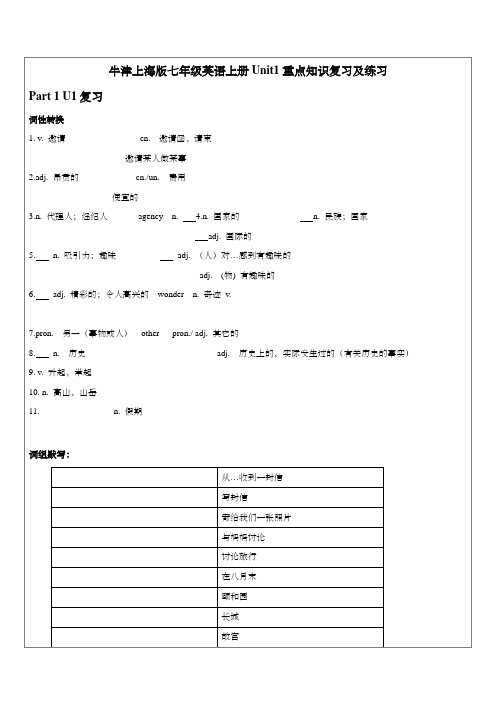
2) 形容词比较级+than the other+复数名词。
例如:Asia is bigger than the other continents on the earth.亚洲是地球上最大的洲◆形容词的常用结构:◇a + adj + n a tall boy ◇be + adj. He is tall.◇keep/find/make/think… it adj. to / that …… ◇be + as + adj. + as do + as + adv. + as1)形容词在句子中的句法作用及位置:⑴ 作定语,放在名......词的前面....,.修饰名词。
结构:a/an/ …_______ 名词 ★ 后置的情况:修饰复合不定代词时放在代词之后。
如:Something serious has happened to him .(他发生了严重的事故) 1. Every minute there is _____going on here.A. exciting somethingB. something excitingC. exciting anythingD. anything exciting 2. This river is about 5 feet ________. A. deep B. widely C. depth D. Length★ 少数形容词只能作定语这些形容词包括 little, live , elder, eldest 等,只能作定语,不能作表语。
例如:(正)My elder brother is a doctor. (误)My brother is elder than I. (正)This is a little house.(误)The house is little. (正)Do you want live fish or dead one?(误)The old monkey is still live.⑵作表语时放在连系动词之后,构成系表结构。
译林版牛津英语七年级(上册)期末复习知识点整理.docx

译林版牛津英语七年级上册期末复习知识点整理Units1--4重点知识点总结n. 名词adv. 副词v.prep.动词介词vt.pron.及物动词代词vi.不及物动词conj.连词adj.形容词1、喜欢like / love / enjoy / be interested in / be crazy about (have a good time +doing sth.动词+doing的还有痴迷于 )/ have fun /Go doing sth. / finish doing sth./Be good at doing sth./ do well in doing sth.How/what about doing sth./practise doing sth.2、“四大看”read vt.看读物(read books/newspaper/magazines/a map等)look vi.瞧常用短语look at/ for/around/after/out/over/up see vt.看见,强调结果I can see you.watch vt.带有欣赏性的观看watch TV/ a film / a football game3、“五大穿着”Put on强调“穿上”的动作 eg. He ____a coat and goes for a walk.Wear 强调“穿着”的状态;进行时态表示暂时的情况eg. She is wearing a newskirt now. / wear glasses Dress(1) dress sb.(2) dress oneself (3)dress up as (4) get dressed In(穿戴 ) 后接颜色(或衣服),表示状态look!Lucy is_____a red skirt and a pair of pink shoes. On后接人指衣服穿在某人身上看出区别来。
(牛津深圳版)英语七年级上册期末全册分单元复习课件
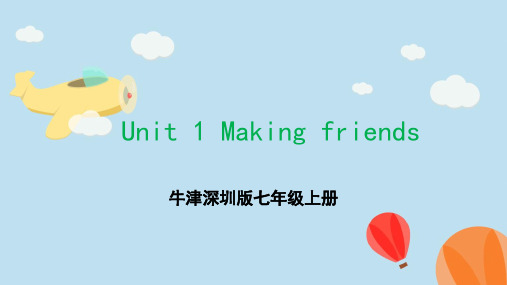
.
A . look B . age C . size
10. To something means to finish doing, making, or producing it.
A . continue B . complete C . start
keys:BCBAB ABBBB
考点通过
二、根据句意或首字母填空
3. —Would you like to live by yourself abroad?
—No. I think I will be lonely and scared.
A . with friends B . on your own C . without money
4. If someone is
单词解析
For example
【例句】 1.He was about the same age as you. 他大约和你的年龄一样。 2.A person of 40 has reached middle age. 人到 40 岁己经步入中年。
拓展
aged = older年长的 of the same age同岁;同龄 at the age of 在…岁的时候 at the age of four = when I was four years old ...
单词解析
For example
【例如】 I have an elder sister and an elder brother. 我有一个姐姐和一个哥哥。 2.My elder sister lives in Canada. 我姐姐住在加拿大。
单词解析
For example
【例句】 1.I like my school because the teachers are all very friendly to me. 我喜欢我的学校因为老师们对我都非常友好。 2.We should be friendly to every classmate in our class.我 们应该对班上的每一位同学友好。
(完整word版)沪教牛津版【广州专用】七年级上册英语期末复习Unit7
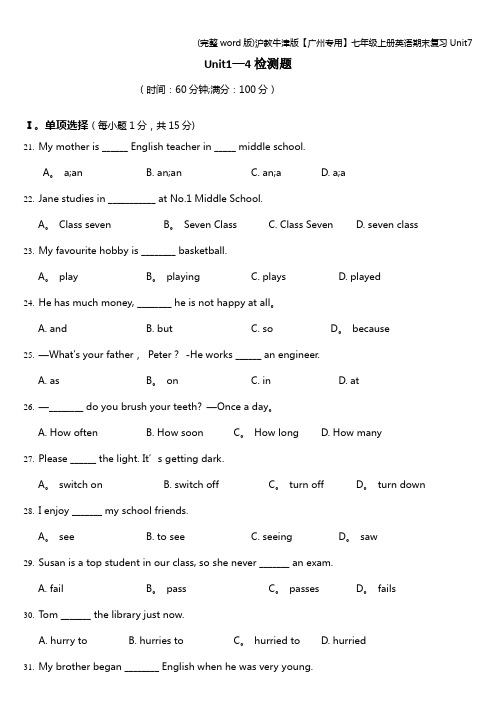
Unit1—4检测题(时间:60分钟;满分:100分)Ⅰ。
单项选择(每小题1分,共15分)21.My mother is ______ English teacher in _____ middle school.A。
a;an B. an;an C. an;a D. a;a22.Jane studies in ___________ at No.1 Middle School.A。
Class seven B。
Seven Class C. Class Seven D. seven class 23.My favourite hobby is ________ basketball.A。
play B。
playing C. plays D. played24.He has much money, ________ he is not happy at all。
A. andB. butC. so D。
because25.—What's your father,Peter?-He works ______ an engineer.A. as B。
on C. in D. at26.—________ do you brush your teeth? —Once a day。
A. How oftenB. How soon C。
How long D. How many27.Please ______ the light. It’s getting dark.A。
switch on B. switch off C。
turn off D。
turn down 28.I enjoy _______ my school friends.A。
see B. to see C. seeing D。
saw29.Susan is a top student in our class, so she never _______ an exam.A. fail B。
电子版_牛津版初中英语七年级_初一上册知识重点归纳
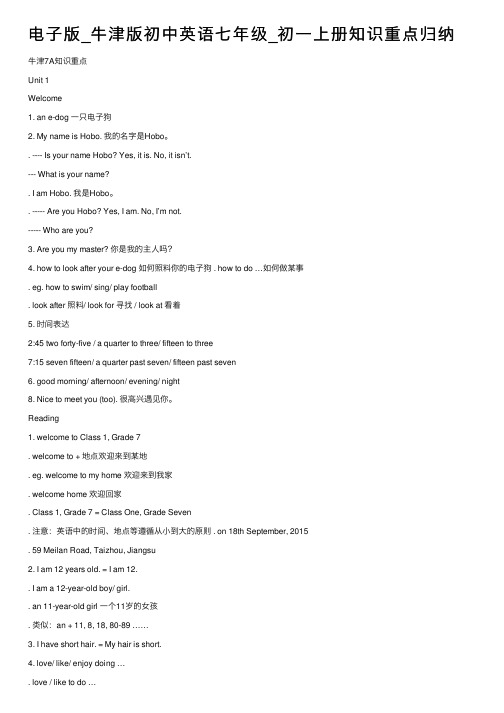
电⼦版_⽜津版初中英语七年级_初⼀上册知识重点归纳⽜津7A知识重点Unit 1Welcome1. an e-dog ⼀只电⼦狗2. My name is Hobo. 我的名字是Hobo。
. ---- Is your name Hobo? Yes, it is. No, it isn’t.--- What is your name?. I am Hobo. 我是Hobo。
. ----- Are you Hobo? Yes, I am. No, I’m not.----- Who are you?3. Are you my master? 你是我的主⼈吗?4. how to look after your e-dog 如何照料你的电⼦狗 . how to do …如何做某事. eg. how to swim/ sing/ play football. look after 照料/ look for 寻找 / look at 看着5. 时间表达2:45 two forty-five / a quarter to three/ fifteen to three7:15 seven fifteen/ a quarter past seven/ fifteen past seven6. good morning/ afternoon/ evening/ night8. Nice to meet you (too). 很⾼兴遇见你。
Reading1. welcome to Class 1, Grade 7. welcome to + 地点欢迎来到某地. eg. welcome to my home 欢迎来到我家. welcome home 欢迎回家. Class 1, Grade 7 = Class One, Grade Seven. 注意:英语中的时间、地点等遵循从⼩到⼤的原则 . on 18th September, 2015. 59 Meilan Road, Taizhou, Jiangsu2. I am 12 years old. = I am 12.. I am a 12-year-old boy/ girl.. an 11-year-old girl ⼀个11岁的⼥孩. 类似:an + 11, 8, 18, 80-89 ……3. I have short hair. = My hair is short.4. love/ like/ enjoy doing …. love / like to do …5. Let’s meet my new classmates.. let sb. do …. eg. let’s be friends. let me help you6. I like sports.. a sports meeting7. I often play football after school.. play football / play chess. play the piano/ violin. after school/ class8. tall and slim9. like music. like listening to music/ like to listen to music10. He is from Nanjing. = He comes from Nanjing.. be from …= come from …11. He is good at Maths. = He does well in Maths. = He studies Maths well. . be good at … = do well in …= do…well. be good at …/ be good at doing…. do well in …/ do well in doing…12. Sandy doesn’t have long hair.13. a new student at Sunshine Middle SchoolGrammar1. in Grade 72. over there3. our English teacher4. 句式变化. The teachers are in the classroom.---- The teachers aren’t in the classroom.Are the teachers in the classroom? Yes, they are. No, they aren’t.Where are the teachers?注意⼏种情况:1. There are some apples on the tree. 疑问句、否定句:some ----any---- There aren’t any apples on the tree.Are there any apples on the tree? Yes, there are. No, there aren’t.2. Sandy is tall and slim. 否定句:and ---or--- Sandy isn’t tall or slim.Is Sandy tall and slim? Yes, she is. No, she isn’t.3. Your sister is in my house. ⼈称变化:1---2,2---1----- Is my sister in your house?Your new teacher is Mr. Wu.---- Is my new teacher Mr. Wu?Integrated skills1. love dancing. be good at swimming. dance ---- dancing, swim --- swimming .双写:run, sit, put, jog, shop, plan, begin 2. hobby --- hobbies 注意:辅以字母+y结尾,变y为i加es 注:boys, toys, monkeys3. This is …, this is…介绍陌⽣⼈4.I see. = I know.. Let me see. = Let me think.5. Glad to see you. = I am glad to see you. . Nice to meet you.Study skills1. 5 个⾳标2. listen to the music3. fly kites4. like playing games5. the cute baby6. go home lateTask1. live with sb. live with my family. live in … live in Beijing. live on … live on the first floor2. wear glasses/ hats/ shoes3. all the lessons. all ⽤于三者及以上4. I have some new friends at school.. at school5. They are all very nice. = All of them are very nice. 注意:all的位置,be动词之前,实意动词之后。
牛津上海版七年级英语上册期末知识点复习汇总
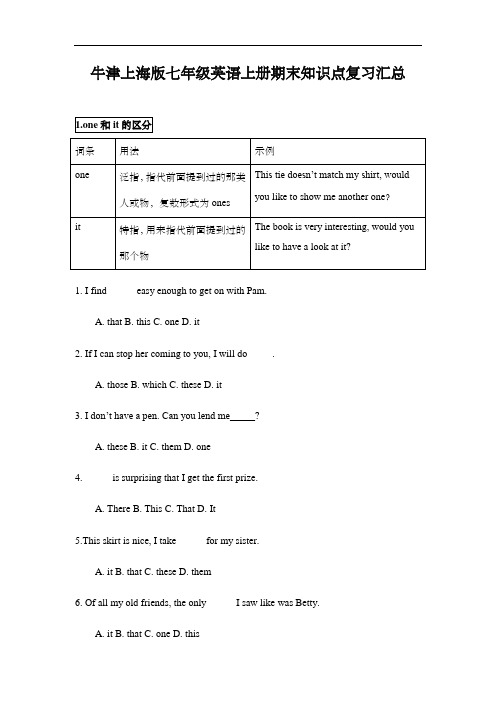
牛津上海版七年级英语上册期末知识点复习汇总1. I find _____ easy enough to get on with Pam.A. thatB. thisC. oneD. it2. If I can stop her coming to you, I will do_____.A. thoseB. whichC. theseD. it3. I don’t have a pen. Can you lend me_____?A. theseB. itC. themD. one4. _____ is surprising that I get the first prize.A. ThereB. ThisC. ThatD. It5.This skirt is nice, I take _____ for my sister.A. itB. thatC. theseD. them6. Of all my old friends, the only _____ I saw like was Betty.A. itB. thatC. oneD. thisbe surprised to do sth做某事感到惊讶( )1. Everyone _______hear the news yesterday evening.A. was surprised toB. was surprised atC. were surprised toD. were surprised at( )2. She _______Tom’s absence.A. was surprised toB. was surprised atC. were surprised toD. were surprised atbe dangerous to swim,“游泳很危险”。
“be +形容词+to do sth”,意为“做某事怎么样”。
七年级上册英语知识点总结沪教牛津.doc

U5单词和短语1.be able to do sth. /can 同义转换单选be(am, is, are,was,were)的形式的考察2.more than/over(U8)同义转换3.have to/must 同义转换两者区别:客观需要/主观看法/have to 有各种时态形式4.breathe/bri:ð/V. /breath n. 给单词写单词5.such as…列举整体之中的部分同类人或事物作例,之前一般用逗号和主句隔开,之后没有逗号,直接加名词性短语,相当于like或for example6.without+(doing)sth.=if there is no sth.同义转换10给词填空7.be nervous about/of (doing) sth.8.leave+SP“离开某地”/ leave for+SP“动身去某地”/leave+SP.+for+SP.“离开某地去某地”9.tie (tying) (lie lying die dying)10.work V.“运转,运行”N.工作(不可数)作品(可数)工厂(works)11. in one’s sleep “在某人的睡梦中;在某人睡着的时候”12.a large/small amount of +N[U] 大/少量的13. space 太空(前用零冠词,不可数)14. feel…about… “对……感到……”句型1. Tomorrow I’ll be one of the first students to travel into space.One of+N(复)“......中之一”;first 后接名词复数时“第一批”、“第一组”X Kb1 .C om2.The Moon is around(=about)380,000 kilometres from the Earth , so it’ll take us about four days to get there. A.对距离提问用how far…;区分how soon…再过多久,对将来的一段时间提问,回答一般是,in+时间段/how often…“隔多久”对频率提问(期末) /how long…“持续多长时间”回答一般是,时间段或for+时间段/how many…/h ow much… B.It takes(V.花费) sb. some time to do something / doing sth. takes sb. some time/ sb spend some time(或money) doing sth. / on sth./ sth. / sth. costs (sb.) +金钱(doing) sth. costs (sb.) +时间 C.get(到达)to+SP.“到达某地”接here、there、home时,to要省略。
牛津深圳版七年级上册英语期末复习各单元知识点提纲

牛津深圳版七年级上册英语期末复习各单元知识点提纲Unit 1 Making friends8. I want to make friends from all over the world9. I like flying kites in my spare time.10. I hope to hear from you.IV. 单元语法--- 特殊疑问词及其释义一、概念:用疑问词引导的疑问句称为特殊疑问句。
特殊疑问句=疑问词+一般疑问句二、疑问词who——对“人”提问疑问词what——对“物”提问疑问词what+名词,对年级,班,排,学号,车号,星期等提问疑问词what对颜色,姓名,时间,职业,计算结果,“存在有”中的主语(人,物),天气,做什么(谓语和宾语),of短语提问疑问词which,对定语提问疑问词whose、whose+名词,对物主代词,名词所有格提问疑问词how 对身体,天气,程度状语、用...工具、用...语言等提问单元语法--- 定冠词a/an一、概念:冠词分为定冠词the,和不定冠词a/an 。
a/an 表示泛指,首次提到的、不限定的人或物,仅用作单数可数名词前。
二. 用法:a/an 用法及比较a 用于发音以辅音音标(不是以辅音字母)开头的单词前面。
an 用于发音以元音音标(不是元音字母)开头的单词前面。
Unit 2 Daily lifeI. 必记单词daily adj. 每日的;日常的seldom adv.不常;很少never adv. 从不ring v.(使)发出钟声,响起铃声ride v. 骑;驾驶End v. 结束;终止usually adv. 通常地practice n. 练习。
牛津初中七年级英语期末复习题(含答案)
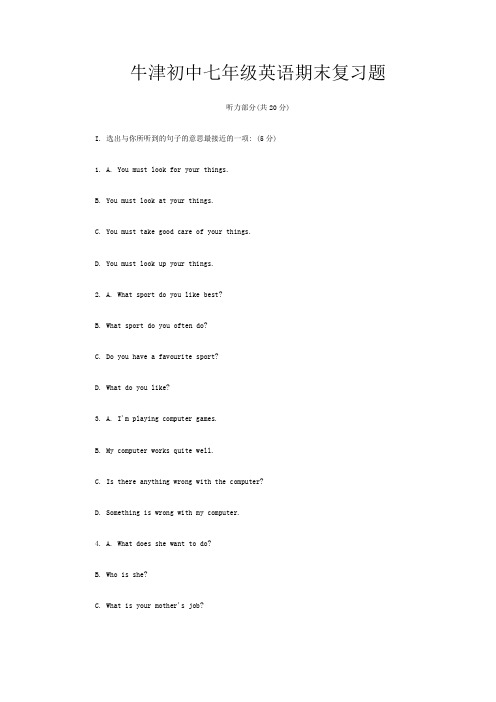
牛津初中七年级英语期末复习题听力部分(共20分)I. 选出与你所听到的句子的意思最接近的一项: (5分)1. A. You must look for your things.B. You must look at your things.C. You must take good care of your things.D. You must look up your things.2. A. What sport do you like best?B. What sport do you often do?C. Do you have a favourite sport?D. What do you like?3. A. I'm playing computer games.B. My computer works quite well.C. Is there anything wrong with the computer?D. Something is wrong with my computer.4. A. What does she want to do?B. Who is she?C. What is your mother's job?D. What are your mother?5. A. Where do you live?B. When did you come here?C. What do you do?D. Where are you from?II. 根据录音中的对话及提问,选择正确答案: (5分)1.2.3. A. No, he can't. B. We don't know. C. Yes, but only a little. D. No, she doesn't.4. A. Yes, he can. B. We don't think so. C. It's hard to say. D. No, he can't.5. A. Basketball. B. Tennis. C. Swimming. D. Football.III. 根据所听短文,选择最佳答案: (10分)1. Wang Hong is a ________.A. studentB. farmerC. teacher2. Sandy is ________.A. EnglishB. CanadianC. American3. Sandy's parents work in ________.A. BeijingB. ShanghaiC. Wuhan4. At first Sandy's Chinese was ________.A. goodB. not very goodC. interesting5. This term Wang Hong has learnt a lot of ________ with Sandy's help.A. ChineseB. EnglishC. Maths笔试部分(共80分)I. 词汇:(10分)A)根据句意及所给的首字母,在每句空格处填写一个适当的单词。
译林版牛津英语七年级上册期末复习知识点整理

译林版牛津英语七年级上册期末复习知识点整理Units1--4重点知识点总结整理教师:Mr Sunn.名词v.动词vt.及物动词vi.不及物动词adj.形容词adv.副词prep.介词pron.代词conj.连词1、喜欢like / love / enjoy / be interested in / be crazy about (痴迷于)/ have fun / have a good time +doing sth.动词+doing 的还有Go doing sth. / finish doing sth./Be good at doing sth./ do well in doing sth.How/what about doing sth./practise doing sth.2、“四大看”read vt.看读物(read books/newspaper/magazines/a map等)look vi. 瞧常用短语look at/ for/around/after/out/over/upsee vt.看见,强调结果I can see you.watch vt.带有欣赏性的观看watch TV/ a film / a football game3、“五大穿着”Put on 强调“穿上”的动作eg. He ____a coat and goes for a walk.Wear 强调“穿着”的状态;进行时态表示暂时的情况eg. She is wearing a new skirt now. / wear glasses Dress (1)dress sb. (2) dress oneself (3) dress up as (4) get dressedIn (穿戴)后接颜色(或衣服),表示状态look!Lucy is_____a red skirt and a pair of pink shoes. On 后接人指衣服穿在某人身上看出区别来。
- 1、下载文档前请自行甄别文档内容的完整性,平台不提供额外的编辑、内容补充、找答案等附加服务。
- 2、"仅部分预览"的文档,不可在线预览部分如存在完整性等问题,可反馈申请退款(可完整预览的文档不适用该条件!)。
- 3、如文档侵犯您的权益,请联系客服反馈,我们会尽快为您处理(人工客服工作时间:9:00-18:30)。
7A 期末考试复习重点
一、必记词汇
1.星期?
Sunday ( 一周的第一天 ) Monday Tuesday Wednesday Thursday Friday Saturday 2.月份
January July
February March April
August September October
May June
November December
3.几次
once twice three times four times
4.副词
(1)一般现在时的标志 ( 表频率 , 用 how often 提问 )
never seldo m sometime s ofte n usually always
(2)表顺序
f ir st then next afterw ard s fina ll y
5.易错词
qui te sug ar la zy le ather pre tt y enou gh mod er n expens ive Inter net with out eas y fruit energy between supermarket volle yball because inte res ting befor e
6.变形词
(1) comfort--- comfort able colour--- colour ful electric ---electric al jump--- j ump er
real--- r eal ly final--- final ly importance ---importan t
cheap--- c heap er hunger ---hung ry suit--- s uit able care--- c are ful
bore--- bor ing health ---health y/health ier
(2)通常情况下用复数
noodle s newspaper s activit ies jean s trainer s boot s vegetable s biscuit s kind s
(3)表人
swim---swim mer play---play er dance---dance r (如表示舞蹈课,应为dancing )
(4)复数的构成
tomato es photo s shelf---shel
potato
radio
ves
es
s
knife---kni
mango
piano
ves
es ( 有生命
s kilo
half---hal
)
ves
s ( 无生命
wife---wi
)
ves ( 妻
子)
story---stor ies country---countr ies month---month s (5) 动词的特殊变形
study---stud wait---wait
ies
ing
carry---carr
eat---eat
ies
ing
fly---fl ies
plan---plan
match---match es
ning lie---l ying
tie---t ying
二、固定搭配
1.必须加 doing
(1) enjoy/ like/ love/ dislike/ hate
practise/ finish/ spend+ doing
look forward to / be good at / do well in
(2) 介词before/ after/ at/ in/ for/ about/ without 后必须加 + doing 2.必须用动词原型
(1) make/ let
(2) 助动词 do/ does/ don’t/ doesn’ t
(3) 情态动词 may/ must/ can/ could / will/ would/ should +
(4) why not..
动词原型3.必须用to do
want to do/be plan to do
need to do/be
wish to do hope to do
would like to do
ask sb to do tell sb to do invite sb to do need sb to do
help sb to do sth ( help sb do sth )
how to do what to do have time/ money to do
三.重要搭配
1. wait for sb to do sth at + 地点 (the bus stop)
2. It is one’s turn to do sth
3. It is time for sth
It is time to do sth
It is time for sb to do sth
4. It is + 形容词+ for sb to do sth
如: It is important for us to be healthy.
5. tell sb about sth talk with sb
6. good luck with sth ( 物 ) good luck to sb ( 人 )
7. sleep/dance + for + 一段时间
绝对不可丢掉
8. 多少电视how much TV 多少小时电视 how many hour s of TV
9. how much + 不可数名词how many + 可数名词复数
10.穿看起来
look. in + 衣服 / 颜色
on + 人
11. dress up as打扮成如: dress up as a ghost打扮成一个鬼
dress up in + 衣服 / 颜色如: dress up in white trousers用白裤子打扮
12.颜色/款式的搭配match very well =go well with
尺寸 / 大小的合身fit sb well
13.花费
物 + cost
人 + spend on sth
pay.. for sth
14.早、中、晚用 in , 但如早、中、晚有任何修饰语,则应用 on;此外,看到 day 就应用on。
